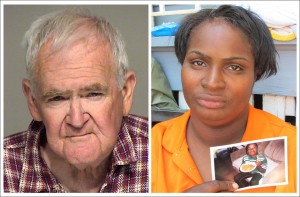Jury: Spooner sane when he killed teen neighbor (UPDATE)
By: Associated Press//July 19, 2013//

MILWAUKEE (AP) — A Milwaukee man knew exactly what he was doing when he accused his teenage neighbor of burglary and then fired a bullet into the boy’s chest, jurors decided Friday. The verdict essentially guarantees that 76-year-old John Henry Spooner will die behind bars.
The same jury decided two days earlier that Spooner was guilty of first-degree intentional homicide in the death of 13-year-old Darius Simmons in May 2012. The trial then shifted into a second phase in which jurors were asked to determine whether Spooner was mentally ill at the moment he pulled the trigger.
It took the jury less than 30 minutes to agree he was sane and in control of his actions at the time of the shooting.
The boy’s mother, Patricia Larry, declined to speak with reporters after the trial but thanked God, the prosecutor and the community. Her son had died in her arms.
“Justice was served,” she said.
Two doctors testified Friday that Spooner has anger issues and aggressive impulses, but that he was neither delusional nor detached from reality when he killed Darius.
Spooner, who is white, never denied killing his unarmed, black next-door neighbor. He testified that he shot Darius because he believed the teen was among the burglars who had broken into his home two days earlier and stolen four shotguns that held deep sentimental value.
He also testified that he wanted to kill Darius’ brother after the older boy ran into the street to help his dying brother. But Spooner didn’t fire because he feared he might endanger other people around them.
Dr. Robert Rawski, a court-appointed forensic psychologist, said that level of recognition shows how Spooner was thinking clearly at that moment.
“He opted not to (shoot) because there was a couple and a child in the distance. He did not want to chance it,” Rawski said, recalling his interview with Spooner last year. “This is an individual who … recognized the environment around him. His anger was very specific.”
Police searched Darius’ home after the shooting but found no stolen weapons.
If t

he jury had found Spooner mentally incompetent, he could have faced life in a mental institution. Instead he faces a mandatory sentence of life in prison, although the judge has the option to set a possible parole date. Wisconsin does not have the death penalty.
He is scheduled to be sentenced Monday afternoon.
The verdict came less than a week after George Zimmerman was acquitted in Florida in the killing of Trayvon Martin, an unarmed black teenager. In the opening days of Spooner’s trial, the judge told the jury pool to separate the cases.
“You understand the facts aren’t the same. It’s a whole different case,” Judge Jeffrey Wagner said.
Spooner’s attorney, Frank Gimbel, said the only similarity between the cases was that both teens were black.
![]()
Race was almost never mentioned in Spooner’s trial, except when he referred to video from his surveillance cameras from the day of the burglary. It showed two black teenage males walking near his house from the direction of Darius’ home. Their faces are hard to make out and neither is carrying Spooner’s guns.
The strongest piece of evidence against Spooner was footage from his own surveillance cameras, which showed him confronting Darius on the sidewalk and pointing a handgun at him. The boy backpedaled a few steps with his hands up. Spooner then exchanged words with Darius’ mother on her porch off screen, and then turned and fired one shot at Darius’ chest.
The teen fled, and Spooner fired a second shot that missed. He tried to shoot a third time but the gun jammed.
Darius died a few moments later across the street, in his mother’s arms.
Spooner, who testified against his attorney’s advice, told the jury he killed Darius because he really wanted his guns back. Prosecutor Mark Williams suggested Spooner was out for revenge.
“I wouldn’t call it revenge,” Spooner replied. “I would call it justice.”
In his closing statements, Gimbel said Spooner’s attitude shows how clouded his client’s thinking was at the time. He said Spooner failed to recognize that his conduct was “outrageously wrong.”
But prosecutor Mark Williams said it would be incorrect to equate a bad temper with mental disease. That would excuse anyone who committed a crime during a moment of anger.
“I don’t know if he even lost control because he was pretty calculated in his shooting,” Williams said. “He knew what he was doing.”
Legal News
- Wisconsin joins Feds, dozens of states to hold airlines accountable for bad behavior
- Trump ahead of Biden in new Marquette poll
- Bankruptcy court approves Milwaukee Marriott Downtown ‘business as usual’ motion
- New Crime Gun Intelligence Center to launch in Chicago
- Arrest warrant issued for Minocqua Brewing owner who filed Lawsuit against Town of Minocqua
- Wisconsin Supreme Court justices question how much power Legislature should have
- Milwaukee’s Common Council now has the most African Americans, women and openly LGBTQ members ever
- Office of School Safety Provides Behavioral and Threat Assessment Management Training Ahead of 25th Anniversary of Columbine Shooting
- Wisconsin Supreme Court to hear arguments in Democratic governor’s suit against GOP-led Legislature
- Lawsuit asks Wisconsin Supreme Court to strike down governor’s 400-year veto
- Wisconsin man pleads not guilty to neglect in disappearance of boy
- ACS Selects University of Wisconsin Law School’s Miriam Seifter for 2024 Ruth Bader Ginsburg Scholar Award
WLJ People
- Power 30 Personal Injury Attorneys – Russell Nicolet
- Power 30 Personal Injury Attorneys – Benjamin Nicolet
- Power 30 Personal Injury Attorneys – Dustin T. Woehl
- Power 30 Personal Injury Attorneys – Katherine Metzger
- Power 30 Personal Injury Attorneys – Joseph Ryan
- Power 30 Personal Injury Attorneys – James M. Ryan
- Power 30 Personal Injury Attorneys – Dana Wachs
- Power 30 Personal Injury Attorneys – Mark L. Thomsen
- Power 30 Personal Injury Attorneys – Matthew Lein
- Power 30 Personal Injury Attorneys – Jeffrey A. Pitman
- Power 30 Personal Injury Attorneys – William Pemberton
- Power 30 Personal Injury Attorneys – Howard S. Sicula











